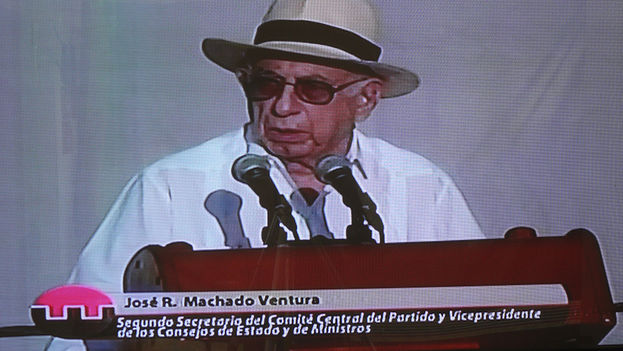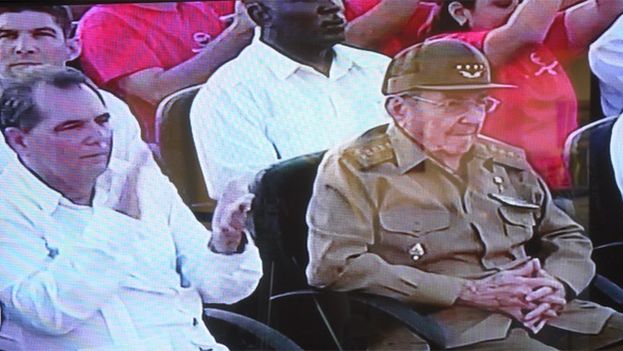
![]() 14ymedio, 26 July 2016 – In a total break with the optimism that Cuban leaders usually squander on every 26th of July, Jose Ramon Machado Ventura addressed this Tuesday the “difficult circumstances” the island is currently experiencing. The vice president evoked, in addition, the problems derived from the international situation whose resolution is “outside the scope” of the government.
14ymedio, 26 July 2016 – In a total break with the optimism that Cuban leaders usually squander on every 26th of July, Jose Ramon Machado Ventura addressed this Tuesday the “difficult circumstances” the island is currently experiencing. The vice president evoked, in addition, the problems derived from the international situation whose resolution is “outside the scope” of the government.
With the first light of dawn, lasting for barely an hour and ten minutes, Sancti Spiritus hosted the main event for the 63rd anniversary of the assaults on the Moncada and Carlos Manuel de Cespedes barracks. The event was punctuated by calls for efficiency and sacrifices, and continuous references to the “economic situation,” characterized by a lack of liquidity that has obliged the government to reduce the expectations for economic growth.
The main speech of the day fell to Machado Ventura, as has happened several times over the last decade. Sitting in the first row of the audience was president Raul Castro, who did not speak publicly and who left as soon as the ceremony concluded.
The constant references to Fidel Castro and his 90th birthday (coming up in August) also marked the event, although the former president did not send a message for the occasion and had to be remembered for his words on 26 July 1953, which he spoke in Sancti Spiritus.
Machado Ventura’s speech emphasized the words with which Castro acknowledged that Cubans had been “capable of stressing and inculcating that the first duty of the revolutionary is work.” The number two man of the Communist Party emphasized that “fulfilling the [economic] plan is not synonymous with meeting the needs of the country nor having reached the existing potential,” and appealed to the “reserves of efficiency” remaining to be tapped.
In response to those who demand faster economic and political transformations, the vice president warned that “the few changes that are necessary will be introduced at the pace we decide,” and declared that “there will be not even the slightest response to external pressures.” The affirmation coincided with what has become the slogan of Raul Castro’s regime: “Without haste, but without pause.”
Some of these pressures to accelerate the transformations on the island have, according to the orthodox leader, “the underhanded or open purpose to dismantle the work of the Revolution.” He stressed this again later when he referenced “the enemies of the country,” without specifying names or details.
Red shirts and little paper flags highlighted the morning under an enormous bronze sculpture dedicated to the patriot of independence Serafin Sanchez, in the plaza of the same name, although missing were the faces of the foreign leaders and personalities who traditionally attend these 26th of July celebrations.
Machado Ventura confirmed that the discussion of the documents of the Seventh Congress of the Communist Party will conclude in September and their final approval by the Central Committee will take place in December. The debate, he explained, involved “hundreds of thousands of militants from the Party and the Union of Young Communists (UJC), and representatives of all sectors of society.”

Machado Ventura defined the Special Period as a stage in which the conquests of the process “had to be temporarily given up, in good part” to avoid a comparison with the current situation, despite the fact that many Cubans fear a repeat of the Special Period in all its gravity.
José Ramón Monteagudo Ruiz, a member of the Central Committee and first secretary of the Party in Sancti Spiritus, said that “there are conditions in the territory to achieve more productive agriculture.” The local official spoke of “the difficulties and damages arising from the current situation,” in reference to the economic cuts and lack of liquidity in the country.
Mentions of the United States embargo were not lacking, although unlike other years the United States and “Yankee imperialism” were not central to the discourse, which was led by the need to make the domestic economy more efficient.
